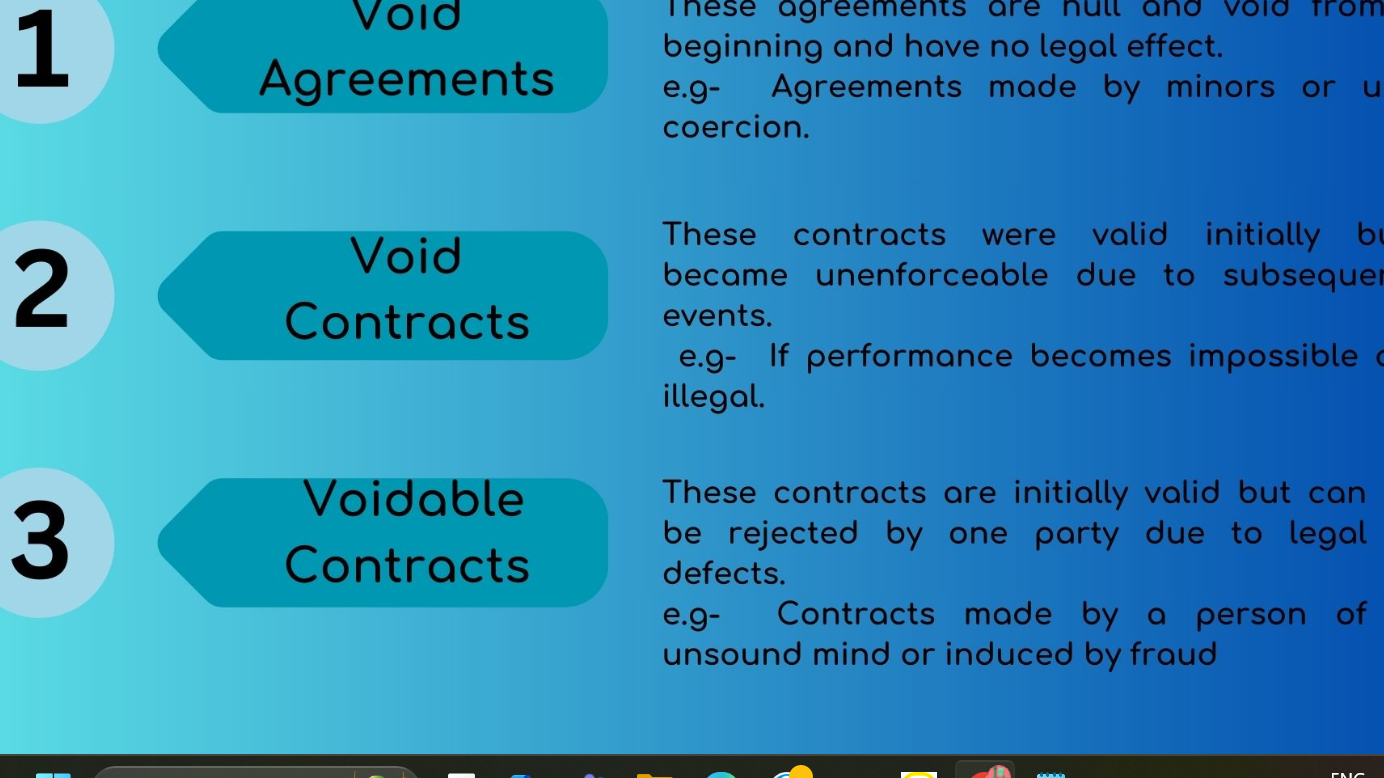
In the realm of contract law, agreements play a crucial role in the functioning of both personal and commercial transactions. Not all agreements, however, are legally enforceable. A void agreement refers to an agreement that is not enforceable by law due to various reasons, making it illegal or invalid from the very beginning. Understanding what constitutes a void agreement is essential for anyone involved in legal, business, or contractual relationships.
Table of Contents
I. What is a Void Agreement?
A void agreement is one that is not legally binding from the outset. In other words, it is a contract that is declared invalid from the moment it is formed. Under the Indian Contract Act, a void agreement lacks essential legal components required for its validity, such as consent, capacity, and legality of the object.
The key aspects that determine whether an agreement is void include:
- Lack of Consent: If one of the parties is not giving free and informed consent, the agreement is considered void.
- Unlawful Object or Consideration: Any agreement whose purpose is unlawful or involves an illegal consideration is void.
- Incapacity to Contract: Agreements made by individuals who are not legally capable of entering into a contract, such as minors, are void.
- Violation of Public Policy: Agreements that contravene public policy, such as agreements that hinder the course of justice or public morality, are void.
II. Legal Framework Governing Void Agreements in India
The Indian Contract Act, 1872 governs the general principles of contract law in India, including the provision on void agreements. Section 2(g) of the Act defines an agreement as “void” if it is legally unenforceable at the time it was made.
Section 2(g) – Definition of Void Agreements:
An agreement that is prohibited by law or illegal in nature is considered void. For example, an agreement to perform an unlawful act or a contract based on fraudulent activities falls into this category.
Section 24-30 – Agreements and Their Validity:
The Act further lays down provisions regarding void and voidable agreements. These sections address conditions under which agreements can be considered void due to factors like:
- Absence of consideration
- Fraud or misrepresentation
- Lack of free consent
- Agreements that are against public policy

P.C. – thelawgist.org
III. Difference Between Void and Voidable Agreements
A key aspect of understanding void agreements is distinguishing them from voidable agreements. While both terms sound similar, they differ in terms of their legal implications.
- Void Agreements:
- These agreements are invalid from the start and have no legal effect.
- They cannot be ratified or enforced.
- Examples include contracts for illegal activities, contracts involving minors, and contracts with illegal consideration.
- Voidable Agreements:
- These are initially valid, but one of the parties has the option to rescind the contract.
- A voidable contract is not automatically invalid but can be canceled by the party who was coerced, misrepresented, or whose consent was not freely given.
- For example, contracts entered into under duress or by someone lacking full mental capacity.
IV. Common Examples of Void Agreements
- Agreement Involving Illegal Activities: An agreement to sell illegal drugs or to bribe a public official is void because the object is illegal.
- Agreement by a Minor: A contract entered into by a minor (under 18 years of age) is void under Indian law because minors cannot legally contract. However, exceptions exist for contracts involving necessary goods or services.
- Agreement Without a Lawful Consideration: If the consideration for an agreement is illegal, such as a payment to conceal a crime, the agreement is void.
- Agreement Against Public Policy: Agreements that violate public policy, such as contracts that hinder justice or promote immoral activities, are void. For example, an agreement not to testify in court in exchange for money would be void.
- Agreement with an Impossible Task: Contracts for tasks that are impossible to perform (e.g., bringing back a dead person) are void.
V. Characteristics of Void Agreements
To better understand void agreements, it’s important to recognize their key characteristics:
- No Legal Binding: Since the agreement is void, neither party can enforce it in a court of law.
- Illegality or Impossibility: The agreement might involve something illegal or impossible to perform.
- Lack of Consent or Consideration: Void agreements often involve issues of consent, such as coercion, fraud, or lack of mental capacity, and may lack lawful consideration.
- Public Policy Violations: Agreements that violate public policy, such as those involving restraint of trade or promoting criminal behavior, are void.
VI. Legal Effects of Void Agreements
The legal effects of a void agreement can be far-reaching:
- No Rights or Obligations: Neither party can sue for performance or damages. There is no legal obligation to fulfill the contract.
- Restitution: If any part of the void agreement has been executed, the parties may be required to return any benefits received, as if the contract had never existed.
- No Enforcement: Void contracts cannot be enforced in court.
VII. Case Laws and Judicial Precedents
Several important case laws have defined and clarified the concept of void agreements in India.
- Gherulal Parakh v. Mahadeo Prasad (1959): The Supreme Court of India held that a contract that is based on an illegal act is void and cannot be enforced in a court of law.
- K.K. Verma v. Union of India (1954): In this case, the court ruled that an agreement made by a minor is void and unenforceable.
- Lalman Shukla v. Gauri Datt (1913): The Privy Council held that a contract entered into by a minor is void under Section 11 of the Indian Contract Act.
- Shivkumar v. R.K. Jain (2008): This case established that agreements made with fraudulent intent or with consideration involving fraud are void.
VIII. Void Agreements vs. Illegal Agreements
A common point of confusion is the difference between void agreements and illegal agreements. While both are unenforceable, they are distinct in terms of their legal implications:
- Void Agreement:
- The contract is unenforceable from the outset.
- Example: A contract to paint a house with a non-existent color is void.
- Illegal Agreement:
- It involves an unlawful act and is inherently prohibited by law.
- Example: A contract to smuggle goods is illegal.
IX. Recent Developments in the Doctrine of Void Agreements
Legal scholars and courts have emphasized a more refined understanding of void agreements in recent years. The rise of digital contracts and online agreements has raised new questions regarding their enforceability, especially regarding issues of capacity, consent, and authenticity.
- Online Contracts and Void Agreements: With the increase in e-commerce and digital transactions, void agreements involving online contracts have become a topic of debate. For instance, contracts that are formed through click-wrap agreements (where a user clicks ‘I Agree’ without reading the terms) may be subject to scrutiny in terms of consent and capacity.
- Changes in Public Policy: As societal values evolve, certain agreements that were once permissible under the law may now be considered void for violating new public policy standards. For instance, agreements promoting discriminatory practices may now be void under evolving human rights law.
X. Frequently Asked Questions (FAQs)
- What makes an agreement void? An agreement is void if it involves an illegal purpose, lacks proper consent, involves a minor, or contravenes public policy.
- Is a void agreement enforceable in court? No, a void agreement is not enforceable in court because it lacks the necessary elements to be valid.
- Can a void agreement be ratified? No, unlike voidable agreements, void agreements cannot be ratified.
- What is the difference between a void and a voidable agreement? A void agreement is invalid from the start and cannot be enforced, whereas a voidable agreement is initially valid but can be annulled by one party under certain circumstances, such as coercion or fraud.
- Can a minor enter into a void agreement? Yes, agreements entered into by minors are void, and they cannot be enforced in court.
- Are illegal agreements void or voidable? Illegal agreements are always void. They are not simply voidable but are considered to have no legal effect.
- What happens if one party breaches a void agreement? Since a void agreement has no legal effect, there is no question of a breach. Neither party is bound by the agreement.
- Are online contracts subject to the void agreement rule? Yes, online contracts are also subject to the same rules. If the agreement involves illegal activities, lacks proper consent, or violates public policy, it may be considered void.
- Can a void agreement be rescinded? No, a void agreement cannot be rescinded since it is considered invalid from the outset.
- What is the remedy for a void agreement? There is no remedy for a void agreement, but if any party has performed the contract, they may be entitled to restitution or return of benefits.
Conclusion
Understanding void agreements is crucial for anyone entering into contracts, whether in personal dealings or business transactions. While void agreements are deemed invalid and unenforceable from the outset, they help clarify the boundaries within which contracts must be created. Legal systems, including India’s, provide a clear framework to identify and deal with void agreements, ensuring that only valid and lawful contracts are upheld.
For more information on contract law and related topics, you can visit official government sites such as:
- Ministry of Law and Justice, India: https://lawmin.gov.in/
- Indian Contract Act, 1872: https://www.indiankanoon.org/
By ensuring that contracts meet the necessary legal requirements, individuals and businesses can avoid the complications that arise from void agreements.
Also Read: A Comprehensive Guide to the Doctrine of Res Gestae: Understanding the Exception to Hearsay Evidence
Also visit: Online Legal Service, Virtual Advice and Consultation
Also Read: Cognizable and Non-Cognizable Offences: Everything You Need to Know



